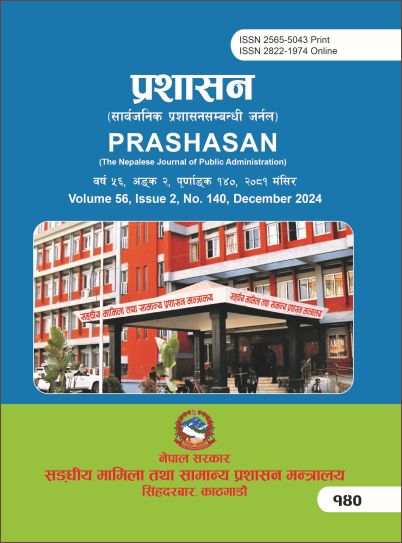Comparative Study of Nepal's Interest Convergence with India and China at the United Nations
DOI:
https://doi.org/10.3126/prashasan.v56i2.75335Keywords:
Nepal, India, China, United Nations, interest convergenceAbstract
India and China are Nepal’s immediate neighbors, sharing borders with the country. Nepal’s relationships with India and China are undeniably its two most significant and consequential bilateral partnerships. While Nepal’s engagement with New Delhi and Beijing is grounded in mutual interests, maintaining a balanced relationship with both neighbors has been a central theme of Nepal’s foreign policy. However, there remains a lack of clarity regarding the specific areas of mutual interest.
One effective way to evaluate these areas is by analyzing their behavior at the United Nations (UN). Each year, hundreds of resolutions addressing a wide range of global issues are voted upon at the UN General Assembly (UNGA). Examining voting patterns can reveal areas of interest convergence (or divergence). To this end, this paper analyzes all resolutions passed by the UNGA via vote since 1972 across eight key areas: arms control, climate change, democracy, development, global law and order, globalization, human rights, and migration.
Nepal participates more actively and almost always positively in UNGA voting compared to its neighbors. Of the 3,035 UNGA resolutions analyzed in this study, Nepal and China voted identically (Yes/Yes or No/No) 72.3% of the time, while Nepal and India voted identically 74.3% of the time. Conversely, Nepal and China voted oppositely (Yes/No or No/Yes) only 3.5% of the time, and Nepal and India did so 3.7% of the time. Overall, Nepal demonstrates significant interest convergence with both India and China.
The convergence score was 0.9 or higher in areas such as climate change, democracy, development, global law and order, and migration. However, it was lowest in arms control (0.77 with China and 0.71 with India), with the most notable divergence occurring on issues related to nuclear non-proliferation.
This research highlights that Nepal shares deep interest convergence with its neighbors on most global issues. By leveraging these areas of mutual interest, Nepal stands to gain significantly in advancing both its national and global interests.
Downloads
Downloads
Published
How to Cite
Issue
Section
License
- The copyright of published materials of the journal remains with Ministry of Federal Affairs and General Administration.
- The published article cannot be reproduced or copied commercially by any person or institution but it can be used non-commercially for academic, research and training purpose providing proper citation is given.




